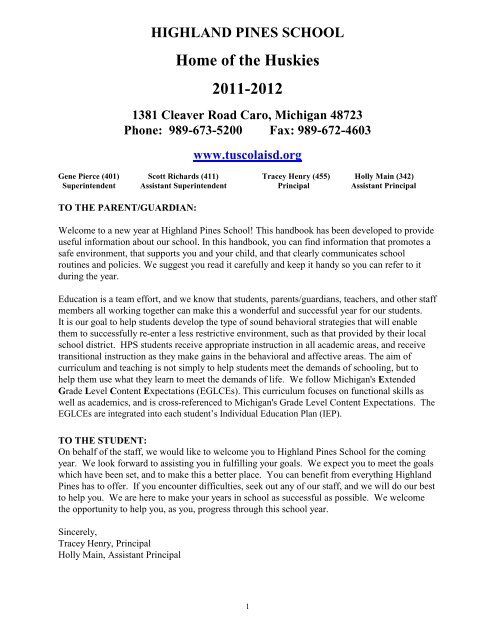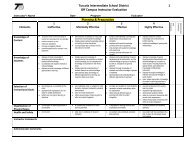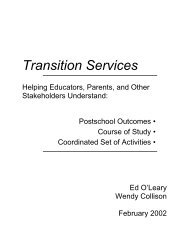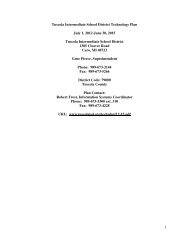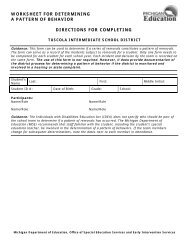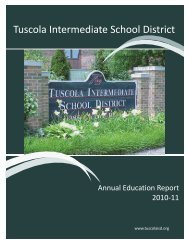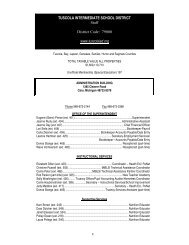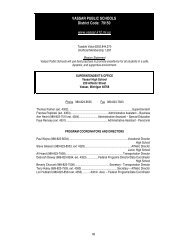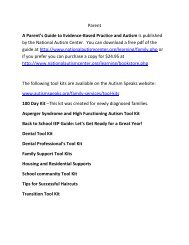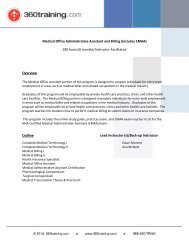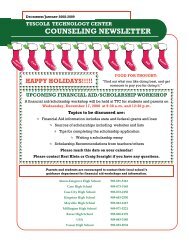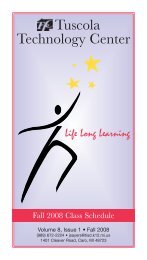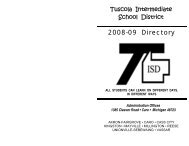Highland Pines Student Handbook - Tuscola Intermediate School ...
Highland Pines Student Handbook - Tuscola Intermediate School ...
Highland Pines Student Handbook - Tuscola Intermediate School ...
Create successful ePaper yourself
Turn your PDF publications into a flip-book with our unique Google optimized e-Paper software.
HIGHLAND PINES SCHOOLHome of the Huskies2011-20121381 Cleaver Road Caro, Michigan 48723Phone: 989-673-5200 Fax: 989-672-4603www.tuscolaisd.orgGene Pierce (401) Scott Richards (411) Tracey Henry (455) Holly Main (342)Superintendent Assistant Superintendent Principal Assistant PrincipalTO THE PARENT/GUARDIAN:Welcome to a new year at <strong>Highland</strong> <strong>Pines</strong> <strong>School</strong>! This handbook has been developed to provideuseful information about our school. In this handbook, you can find information that promotes asafe environment, that supports you and your child, and that clearly communicates schoolroutines and policies. We suggest you read it carefully and keep it handy so you can refer to itduring the year.Education is a team effort, and we know that students, parents/guardians, teachers, and other staffmembers all working together can make this a wonderful and successful year for our students.It is our goal to help students develop the type of sound behavioral strategies that will enablethem to successfully re-enter a less restrictive environment, such as that provided by their localschool district. HPS students receive appropriate instruction in all academic areas, and receivetransitional instruction as they make gains in the behavioral and affective areas. The aim ofcurriculum and teaching is not simply to help students meet the demands of schooling, but tohelp them use what they learn to meet the demands of life. We follow Michigan's ExtendedGrade Level Content Expectations (EGLCEs). This curriculum focuses on functional skills aswell as academics, and is cross-referenced to Michigan's Grade Level Content Expectations. TheEGLCEs are integrated into each student’s Individual Education Plan (IEP).TO THE STUDENT:On behalf of the staff, we would like to welcome you to <strong>Highland</strong> <strong>Pines</strong> <strong>School</strong> for the comingyear. We look forward to assisting you in fulfilling your goals. We expect you to meet the goalswhich have been set, and to make this a better place. You can benefit from everything <strong>Highland</strong><strong>Pines</strong> has to offer. If you encounter difficulties, seek out any of our staff, and we will do our bestto help you. We are here to make your years in school as successful as possible. We welcomethe opportunity to help you, as you, progress through this school year.Sincerely,Tracey Henry, PrincipalHolly Main, Assistant Principal1
C. ATHLETIC CODE OF CONDUCT .............................................................. 15VI. RIGHT TO KNOW ........................................................................ 16A. HAZARDOUS MATERIALS ....................................................................... 16B. PESTICIDE APPLICATIONS ...................................................................... 16C. ASBESTOS .................................................................................................... 16VII. AMERICANS WITH DISABILITIES ACT ............................ 18VIII. RELEASING STUDENT DIRECTORY INFORMATION 18I. HIGHLAND PINES SCHOOL MISSIONSTATEMENT & BELIEFSMission Statement:The staff at HPS will join parents and the community in assisting eachstudent to reach his/her maximum level of independence as individualsand as responsible members of society. Each student shall have theopportunity to grow intellectually, physically, and emotionally.We believe: Learning is a lifelong process and everyone can benefit. Staff growth/development is crucial to obtain educational excellence. A positive environment is necessary to enhance student’s self-confidence. Self-esteem and a sense of responsibility are necessary for productive citizenship. Adaptability assists in growth and change. The more independent students become, the less restricted their lives will be. Each student can learn responsibility when there are opportunities to give as well as receive. A safe and predictable environment is a necessary base for improving and learning new skills. Each student’s uniqueness and value should be recognized and provided throughindividualized planning and instruction. <strong>Student</strong>s learn by doing; therefore, frequent opportunities to interact and participate must beprovided.A. PARENT INVOLVEMENTResearch and practice experience indicates parent involvement has multiple benefits for studentsand schools. <strong>Student</strong> benefits can include improved skills, grades, better attendance, higher ratesof homework completion, more positive attitudes towards school, less disciplinary actions andimprove test scores. <strong>School</strong> benefits can include improved teacher/student morale, betterrelationships between teacher and parents, improved community perceptions, and positivechanges in student achievement.3
TISD Board Policy:The <strong>Tuscola</strong> <strong>Intermediate</strong> <strong>School</strong> District supports parental involvement as both a valuable resource andally in teaching and learning for our students. We consider parents/guardians essential partners in theeducational and psycho-social development of their children.The building principals will act as the key liaison for parent involvement. The building principals willprovide leadership for the development and implementation of a parent involvement plan. Parentinvolvement may include both school and home activities. The parent involvement plan will includespecific attention to obstacles which preclude parent/guardian participation with intended remedies.The <strong>Tuscola</strong> <strong>Intermediate</strong> <strong>School</strong> District actively encourages parental participation in all of theprograms it operates. Parents are involved in a wide variety of activities including, but not limited to:Parent Teacher Conferences, Individual Education Planning Team Meeting, Parent Survey, ProgramAdvisory Committee and the Parent Advisory Committee.Legal Reference: Michigan P.A. 107-Parent Involvement Plan is required by January of 2005. It will bedistributed to each parent/guardian in the relative district or P.S.A.Federal NCLB Title I-<strong>Student</strong>/Parent contacts required for receipt of Title I funding. Other requirementsinclude meetings, parent participation in plans, review and improvement with assessment. Policy Adopted: Fall 2004B. PARENT INVOLVEMENT PLANAs <strong>Highland</strong> <strong>Pines</strong> <strong>School</strong> staff, we will:Provide a safe, positive learning environment.Show that we care about all students and respect the uniqueness of all students and their families.Deliver a high quality curriculum through motivation and interesting learning experiences.Address each student’s needs and encourage individual talents.Value and respect the importance of parents’ role in education of their children.Communicate academic progress and attendance concerns through report cards 4 times a year,notes, phone calls and newsletters.Establish flexible scheduling and create a warm atmosphere for parents/guardians duringclassroom visits and participation in the activities.Help parents to support learning and positive behavior at home.As a <strong>Highland</strong> <strong>Pines</strong> <strong>School</strong> student, I will:Arrive at school and attend class on time each day.Put forth my best effort that includes paying attention and participating in class discussions.Promptly deliver to parent(s) and teacher(s) all letters, messages and notes from school or home.Cooperate with other students and adults at school.Respect the rights and property of others and follow all school rules. This includes showingrespect by not acting hostile or creating fear in others.Use appropriate language to communicate with adults and other students.Practice and demonstrate our three school wide expectations:1) Be Responsibility 2) Be A Friend 3) Be SafeAs the parent or guardian, I will:Encourage my child’s development and progress in school. For example:Read and listen to my child regularly and make reading part of my child’s day.Review and discuss schoolwork and homework. This includes offering assistance when needed.4
II.Ensure that my child attends school on time each day and is ready to learn.Show the value of learning self-control and hard work. For example:Help my child see how school learning is needed in the real world.Recognize and praise my child’s efforts and progress.Contribute to good home/school communication. For example:Share information with school staff about unique family or child circumstances that may affectmy child at school.Read newsletters, notes, and other communications and discuss and/or respond when needed (orappropriate).Attend IEP meetings, and any other meetings concerning your child.Share concerns about my child and about the school and work together with school to resolveproblems.If an explanation is offered for extenuating circumstances that prevent the parent/guardianfrom a full commitment, school official(s) will consider accessing resources that assistparent(s)/guardian(s) with achieving their goals.POLICIESA. SCHOOL ATTENDANCEDue to staff involvement in other activities, students who are transported to school other thanby bus must not arrive prior to 8:45 a.m. Classes start promptly at 8:50 a.m. Buses will beloaded and leave by 3:10 p.m.As we work together to help HPS students learn and grow towards independence, we needyour cooperation. <strong>Student</strong> accounting procedures from the state requires us to have on recorda parent contact. If a pattern of persistent absence occurs without reason, a referral will bemade to the appropriate agencies. When a necessary absence from school occurs, a call to theTransportation Department (ext. 365) is needed to report your child’s absence. Parents needto make every effort to have their child ready for bus pick up. Being on time for school isvery important.Good habits start early. Tardiness is very disruptive to a child’s learning. Instruction for theclass’s daily work schedule is given first thing in the morning. Being on time is a habit thatis an important life skill! Parents, students, teachers, counselors and administrators have theresponsibility to monitor school attendance. Parents have an obligation under the law toensure regular school attendance. An occasional tardy due to unforeseen circumstances isunderstandable.The primary responsibility for recording attendance shall be assigned to the classroom teacher underthe supervision of the building Principal and using methods prescribed by the Superintendent and theState Department of Education. Agency personnel are to follow the state guidelines regardingstudent attendance accounting and reporting.Tardiness - <strong>Student</strong>s who arrive between ten (10) minutes and thirty (30) minutes after the start of theday will be considered tardy.Half Day - <strong>Student</strong>s who arrive between thirty-one (31) minutes and three and a half (3 ½) hours latewill be considered a half-day absent.Full Day - <strong>Student</strong> who are absent more than three and a half hours (3 ½) are considered a full dayabsent.Early Departure – <strong>Student</strong>s who leave between one (1) minute and thirty (30) minutes early areconsidered to have left early. <strong>Student</strong> will be marked tardy.5
Truancy – In the event that a student is experiencing attendance/tardy problems, the parent will receiveproper counseling and encouragement from school staff to attend school on a regular on time basis. Ifproblems continue, a report will be filed for school truancy.Research clearly shows that regular school attendance is critical to success.<strong>Student</strong>s leaving early – It is highly recommended, in order to decrease the disruption in HPSclassrooms and routines; students leaving the building after 12:30 p.m. are welcome to return to HPS thefollowing day.AM Early Childhood classes start promptly at 8:50 a.m. <strong>Student</strong>s are dismissed at 11:45 a.m.PM Preprimary classes start at 12:15 p.m., and students are dismissed at 3:00 p.m. Preprimary classesrun Monday – Thursday only.B. LUNCH MONEYIt is appreciated if money is sent in advance. The money can be sent daily, weekly, or on a monthlybasis.Prices (subject to change): <strong>Student</strong> Lunch daily (Not including salad bar) $2.00Salad bar: Per ¼ pound $ .75Milk Only $ .35C. TRANSPORTATION AND WEATHERIt is the policy of the TISD Board of Education to provide safe, economical transportation to thosechildren affected by excessive distances, extraordinary or excessive hazards to pedestrian safety, andpersonal handicaps.Bus routes are planned to achieve maximum economy of operation and safety with student needs as afactor. Every effort is made to plan routes and to keep individuals riding distance and time to a practicalminimum. Information regarding individual bus routes will accompany the letter sent to parents prior tothe first day of school.Each student will be assigned to use a specific bus/bus stop and shall not be permitted to use any otherwithout permission. Permission may be granted for a student to ride a different bus or use a differentstop only upon receipt of a written request from a parent/guardian. Permission is to be requested fromthe Transportation Office at <strong>Highland</strong> <strong>Pines</strong>. Alternate stops are granted only if they are along existingroutes.<strong>Student</strong>s may be granted to ride their bikes or walk to and from school only when written permission bythe Parent/Guardian is turned into the Transportation Office. <strong>Student</strong>s MUST park and lock their bikesin the designated area.If your child(ren) will not be attending school at any time due to illness, etc., please notify ourTransportation Department @ 989-673-5200 ext. 365. Your call will enable us to cancel transportation toyour home on that day.<strong>Student</strong> discipline problems on school buses are to be handled by the bus driver and/or bus attendant/busaide. This includes advising students of rules, regulations, assigning seats, encouraging and praising goodbehavior, and other generally accepted means of maintaining and developing constructive pupil-schoolrelationships.Videos cameras have been installed on all buses.The driver and/or bus attendant/aide shall report instances of significant misconduct in writing to theTransportation Supervisor and appropriate action will be taken as outlined in the TISD TransportationPolicy. Discipline Referral Forms are available on every bus.6
Bus Rules: Be Responsible – Be a Friend – Be SafeStay in assigned seatsKeep feet and hands to selfOpen and shut windows with permissionTalk nicely with the person sitting next to youHelp when needed or askedFace the front of the busKeep seat belt onWalk up and down the stairs using the railingKeep belongings at the front of the busYou know best what weather conditions your child tolerates. Please feel free to keep your child homefrom school and/or transport your child yourself if you feel the weather conditions will cause him/her toexperience discomfort. Some of our students cannot tolerate extremely cold or very hot weather andwould be more comfortable at home.For your convenience, we now have an AUTOMATED CALLING SYSTEM so we can notify youduring early school closings or emergency situations. Whenever there are changes in school hours orschool calendar, we will automatically notify you via the automated phone calling system. Thisnotification goes out immediately when decisions are made relating to school hours changes. You couldreceive a phone call very early in the morning or late at night depending on the circumstances. Pleaselook for the paper work that will be sent home with your child in the beginning of the school year. Wealso have several radio/TV stations, which will be giving school-closing information for the <strong>Tuscola</strong><strong>Intermediate</strong> <strong>School</strong> District. Those radio/TV stations are as follows:WKYO- 1360 - AM - CARO WIDL - 92.1 - FM - CARO WNEM -TV5-SAGINAWWHNN- 96 FM - BAY CITY WIOG 102.5 - FM - SAGINAW WJRT-TV12-FLINTWMIC 97.7 FM - SANDUSKY WLEW 102.1 FM - BAD AXE WKCQ-98.1 FM -SAGINAWDue to the variety of programs we offer and the large geographic area we serve, it is necessary for us tomake special announcements concerning school closings. If the school district you live in is cancelled,we will not be providing transportation to your home that day. If your school district is on a 2 hourdelay, our buses will be running on the same delay schedule for that district. It applies to both studentsand staff, therefore your child is not allowed in the building until 10:45 a.m. due to NO staff in thebuilding to provide supervision for your child.Let us explain the following message we will be using on the radio.Example: 1) “ALL T.IS.D. PROGRAMS ARE CLOSED”No programs will be operating and staff will not report. (Tech Center and <strong>Highland</strong> <strong>Pines</strong><strong>School</strong> are closed.) Buses will not be operating.Example: 2) “HIGHLAND PINES SCHOOL IS CLOSED”<strong>Highland</strong> <strong>Pines</strong> buses will not operate.E. SCHOOL WELLNESS POLICY<strong>Highland</strong> <strong>Pines</strong> <strong>School</strong> is committed to creating a healthy school environment that enhances thedevelopment of lifelong wellness practices to promote healthy eating and physical activities that supportstudent achievement.Every year, students, Pre-K through age 25, shall receive nutrition education that is in concordance withthe school’s wellness policy. A nutrition education that teaches the knowledge, skills, and values neededto adopt healthy eating behaviors shall be integrated into the curriculum. Nutrition educationinformation shall be offered throughout the school campus including, but not limited to, school diningareas and classrooms. Staff members who provide nutrition education shall have the appropriatetraining.7
An Action Plan developed by the <strong>Highland</strong> <strong>Pines</strong> <strong>School</strong>’s Coordinated <strong>School</strong> Health team: Establish a school-wide “Health Awareness” Month ( February) Steps to be taken:o Posters made by studentso Class discussions and activitieso AssembliesNutrition StandardsThe district shall ensure that reimbursable school meals meet the program requirements and nutritionstandards found in federal regulations. The district shall encourage students to make nutritious foodchoices.The district shall monitor all food and beverages sold or served to students, including those availableoutside the federally regulated child nutrition programs. The district shall consider nutrient density andportion size before permitting food and beverages to be sold or served to students.The school principal shall continually evaluate vending policies and contracts. Vending contracts that donot meet the intent and purpose of this policy shall be modified accordingly or not renewed.The Coordinated <strong>School</strong> Health Team Action Plan: Food Services Department at HPS will be given an opportunity to consult with anutritionist/dietician at least once a year Food Services Department will review menus for students requiring pureed food in order todevelop more selectionsPhysical Education and Physical Activity OpportunitiesThe district shall offer physical education/physical activity opportunities that include the components ofa quality physical education program. The program shall equip students with the knowledge, skills, andvalues necessary for lifelong physical activity. Physical activity will be in concordance with theExtended GLCE’s guidelines.Every year, all students, Pre-K through age 25, shall have the opportunity to participate regularly insupervised physical activities, either organized or unstructured, intended to maintain physical fitness andto understand the short and long-term benefits of a physically active and healthy lifestyle.Other <strong>School</strong>-Based Activities Designed to Promote <strong>Student</strong> WellnessThe district may implement other appropriate programs that help create a school environment thatconveys consistent wellness messages and is conducive to healthy eating and physical activity.The HPS Coordinated <strong>School</strong> Health team’s action plan includes the following: A Staff Wellness Program Steps to be taken:o a different activity each montho on-going year roundF. HEALTH POLICYNursing Department - Our school nurse is a registered nurse with certification from the Dept. ofEducation to function as a school nurse. She works in conjunction with a Licensed Practical Nurse.Health - Our students’ general health and well being is of utmost importance in their ability to functionin school and reach their optimum potential. It is also essential in planning each child’s individualprogram for the school to be aware of all conditions pertinent to your child’s health, both mentally andphysically. Periodic hearing screenings may be performed throughout the year.General Requirements - Upon admission to school, parents need to complete a Health History Formand supply proof that their child has been immunized as required by Michigan Law. Any child entering8
school who does not meet the State’s required immunizations will have 30 days to do so. If shots are notup-to-date in 30 days, your child will not be able to attend school. A complete physical prior to startingschool is highly recommended.Illness & Absences - Although regular attendance is important for each student to reach their potential,there are times when illness interferes. Many of our students are more susceptible to illness than theaverage child would be. Please be watchful for symptoms of communicable diseases such as: red,watery eyes, flushed face, swollen glands, colds, fever, vomiting, or diarrhea and keep your child homeif he/she gives any indication of being ill. Our school nurse checks the students on a daily basis. It isour school policy that if your child has a fever, before they return to school, they are fever-free for a 24hour period without medication. Any child showing symptoms of a communicable disease will beremoved from the classroom. Parents will be notified and expected to take their child home.Parents are requested to notify the school if their child is going to be absent. Please notify the nursingoffice. It is important to let us know the reason your child is absent. In the event of an extended absencedue to illness/absence, please send a doctor's note with your child upon returning to school outliningtreatment your child received.In the event of an extended absence and if no contact with the school has been made, the following willoccur:1. After the student's third consecutive day absent, the teacher will make a phone call anddocument reason for absence.2. After a student's fifth consecutive day absent, the teacher will notify the nurse. The nurse willcontact the parents and document reason for absence.3. After a student's tenth consecutive day absent, the principal will contact the student's familyand do a follow up letter.4. If the problem continues, the truancy officer may be asked to investigate.Medication - Please notify the school nurse of any medication your child is taking. Whenever possible,medications should be scheduled around school hours. If your child must take medication during schoolhours, you will need to sign a permission form and supply the school with a Doctor’s Order and acurrent properly labeled pharmaceutical container.All medicine must be sent to school in a properly labeled container with the following information:<strong>Student</strong>’s NameName of the DrugThe Dosage & Time It Is to Be AdministeredName of the Doctor Prescribing ItCurrent DateMost pharmacies will give you an extra bottle for school use. You may bring the medicine in to schoolor send it with the bus driver. <strong>Student</strong>s are not allowed to carry medications or have them in their bookbags for obvious safety reasons. Also, it is convenient if you could send enough medicine for one monthat a time.Grooming - Good personal hygiene and proper clothing are a necessary part of maintaining goodhealth. We encourage you to assist and/or supervise your child in regular bathing and hair washing (atleast every other day). Clothes should be clean, neat, and appropriate for the weather. Heavy coats, hats,mittens/gloves, and/or boots must be worn in the winter months.Dress Code - Clothing, which contains offensive language/messages or gestures, is sexually suggestivein wording or sketches, or advertises or advocates illegal practice (drugs, alcohol, tobacco, or firearms) isnot allowed.Sagging jeans, shorts, or oversized clothing are not allowed.9
Halter-tops, any attire showing cleavage, tank tops, muscle shirts, bare midriff shirts, seethroughsheers, short shorts (shorts should be 22 inches long), and exposed undergarments arenot allowed.Shoes must be worn by students at all times.Two piece bathing suits are not permitted to be worn in the pool at any time.Jackets, coats, hats, or bandannas are not to be worn during the school day without prioradministrative approval. These items, if worn to school, are to be placed in lockers during theday.<strong>Student</strong>s who violate the dress code will be issued a warning. Repeat violations may result inparent being called and/or disciplinary action taken.Special occasions may require a special style of clothing (example, dances, picnics, SpecialOlympics, etc.).G. RESPIRATORY SENSITIVE STUDENTS AND STAFFDue to the respiratory sensitivity of many of our students and staff, please try to refrain from wearingperfume, cologne, after-shave, and scented lotions. No latex balloons are allowed in the school or atschool functions due to allergies.H. DOG THERAPYAll dogs must be trained and approved by the Therapy Dogs International Association. Vaccinationrecords will be given to the school and kept on file in the office.All dogs should be well groomed prior to entering the school building. Dogs will be under control andwith their owner or a responsible adult at all times. Dog activities and schedules are developed throughcollaboration with staff and the dog owner. Dogs may visit rooms; students may assist with walks andtoileting. <strong>Student</strong>s may visit dogs in certain rooms/areas. Dogs may interact with students in a calmingor playful manner, depending on the needs of the students.I. HOLIDAY PARTIES AND DANCESAll students regardless of their age may participate in school wide event activities. Each classroomteacher will determine the amount of time and how elaborate classroom parties are to be. <strong>Student</strong>s mayelect to wear the type of clothing appropriate for the activity. The classroom teacher and the buildingprincipal will have the final say in regard to the appropriateness of costumes.Our monthly school dances are held in the HPS gymnasium for classrooms that desire to participate inthis casual, social activity. Due to the large number of students that take part in the dances, we requestthat parents who desire to attend the event limit their visit to the last thirty minutes (2:00 – 2:30 p.m.). Ifa student needs careful monitoring during a social, large group activity, a teacher may possibly requestthat the parent/guardian assist in supervision.J. VISITORS & TOURSParents, Guardians, and Outside Agencies are always welcome to the school. However, it is necessary tocall ahead and make an appointment to ensure that the regular classroom teacher can meet with you.When you do come to visit, you MUST enter the building through the main entrance and sign in with ourreceptionist to receive a visitor pass. A staff member will escort you to the classroom. We ask allparents and visitors to do this so we can keep our school safe and secure.K. PHONE CALLSThe school phone number is 989-673-5200. If you wish to talk to your child’s teacher, the best times tocall are between 8:15 a.m. - 8:45 a.m. and 3:00 p.m. - 3:15 p.m. Administrators, secretaries, and thenurse are available throughout the school day. Please call the Transportation office for busing issues,schedule changes, etc. – 673-5200 or 673-2144, ext. 365 or 362.10
L. STUDENT CELL PHONE AND ELECTRONIC DEVICE USE<strong>Student</strong>s may bring cell phones to school, but they must be kept out of sight and turned off during schoolhours. Both the teacher and Transportation MUST have the student’s cell phone number on file. PerTeacher permission, a student may use their cell phone. In the event of an emergency, students arepermitted to use phones on the ISD Campus.The use of DVD players is allowed in school and on the bus with teacher and bus driver permission.However, due to the various age levels of students, only PG movies may be displayed while on schoolproperty. CD players, iPods/MP3, and portable game systems are also allowed with permission, but mustonly be heard by the student using them. The first violation of this policy will result in the confiscationof the electronic device. Confiscated devices will be returned at the end of the day. Further offenses willresult in confiscation and disciplinary action.M. INTERNET USAGE POLICYThe use of <strong>Highland</strong> <strong>Pines</strong> <strong>School</strong> classroom computers support learning and enhance classroominstruction. <strong>Student</strong>s will utilize the computers in the building in a responsible, ethical, and legalmanner. Failure to adhere to this guideline will lead to disciplinary action. Unacceptable uses of thecomputer network include but are not limited to:1. Violating United States and/or Local Law2. Using and/or viewing profanity, obscenity or other language, which may be offensive to others.3. Copying commercial software in violation of copyright law.4. Viewing material on the internet which is violent, obscene, or degrading to persons, animals, orgroups.N. PARENT/GUARDIAN CONFERENCESParent-teacher conferences take place at Individual Education Planning Committee (I.E.P.C.) meetings,and at other times, as arranged. The purpose of the annual I.E.P.C. meeting is for the school staff, alongwith the parent/guardian, to develop an educational plan designed to meet the individual needs of thestudent. The Individualized Education Plan (IEP) is written so that the parent and each person workingwith the student, knows that goals have been set and how each service will help your child.O. FIRE/STORM/CRISIS DRILLFire and other evacuation drills are held during the school year with all students participating. <strong>Student</strong>sand staff may need to leave the building during drills.P. SMOKINGIt is State Law and the policy of the <strong>Tuscola</strong> <strong>Intermediate</strong> <strong>School</strong> District to enforce and adhere to PA198 of 1986, sometimes referred to as the “Clean Air Act.” These guidelines are established to ensurethat proper steps are taken to protect the nonsmokers in the school community. Tobacco of any type isnot permitted on the school campus during the day. Absolutely NO lighters of any kind are allowed onschool property during school hours.Q. STUDENT DRIVING POLICYOnly under special circumstances will students be granted the privilege of a driving permit. A committeeconsisting of the building principal, the student’s classroom teacher, and a member of the CPI Policy andSafety Committee will determine the issuing of driving permits. <strong>Highland</strong> <strong>Pines</strong> <strong>School</strong> has the right todeny your privilege to drive to school. <strong>Student</strong>s may get the necessary forms to apply for a drivingpermit in the office.R. GRADUATE STUDENTSUpon graduation, the student’s program is complete. Graduates can only attend HPS events aftergraduation with classroom teacher approval. We invite graduates to attend special events in years tofollow which include the Bazaar, Spring Fest, Christmas Concert, and Graduation, etc. <strong>Highland</strong> <strong>Pines</strong>policy is that Graduates are allowed to come back to visit during “community” events.11
S. SECLUSION & RESTRAINTSSUPPORTING STUDENT BEHAVIOR:STANDARDS FOR THE EMERGENCY USE OF SECLUSION AND RESTRAINTSeclusion is a last resort emergency safety intervention that provides an opportunity for a student toregain self-control. Seclusion is the confinement of a student in a room or other space from which thestudent is physically prevented from leaving and which provides for continuous adult observation of thestudent. A room or area used for seclusion:Must not be locked;Must not prevent the student from exiting the area should staff become incapacitated or leavethat area; andMust provide for adequate space, lighting, ventilation, viewing, and the safety of the student.Time and Duration – Emergency seclusion (prohibited for pre-school students) should not be used anylonger than necessary to allow a student to regain control of his/her behavior, but generally:Elementary school students – no longer than 15 minutes; andMiddle and high school students – no longer than 20 minutes.If an emergency seclusion lasts longer than the suggested maximum time, the following arerequired:o Additional support (e.g., change of staff, introducing a nurse or specialist, obtainingadditional expertise); ando Documentation to explain the extension beyond the time limit.Physical Restraint is a last resort emergency safety intervention involving direct physical contact thatprevents or significantly restricts a student’s movement. Restraint is an opportunity for thestudent to regain self-control. Physical restraint is not intended to forbid actions undertaken:to break up a fightto take a weapon away from a studentthe brief holding by an adult in order to calm or comfortthe minimum contact necessary to physically escort a student from one area to anotherassisting a student in completing a task/response if the student does not resist or resistance isminimal in intensity or duration.To hold a student for a brief time in order to prevent an impulsive behavior that threatens thestudent’s immediate safety (e.g., running in front of a car)Time and Duration – Restraint should not be used:Any longer than necessary to allow students to regain control of their behavior; andGenerally no longer than ten minutesIf an emergency restraint lasts longer than ten minutes, the following are required:o Additional support (e.g., change of staff, introducing a nurse or specialist, obtainingadditional expertise); ando Documentation to explain the extension beyond the time limitReoccurring Behavior – Should a pattern of behavior emerge, or be anticipated, which may require theuse of emergency restraint, the school personnel must:Conduct a functional behavioral assessment;Develop or revise a PBSP to facilitate the reduction or elimination of the use of restraint;Develop an assessment and planning process conducted by a team knowledgeable about thestudent, including:o The parento The student (if appropriate)o People who are responsible for implementation of the PBSPo People who are knowledgeable in PBS.12
Documentation and Reporting – Each use of an emergency seclusion and the reason for each use shallbe:Documented in writing and reported to the building administration immediately;Reported to the parent or guardian immediately or as soon as possible; andDocumented in a written report for each use of seclusion (including multiple uses within a givenday) and given to the parent or guardian within 24 hours.Once again, seclusion and/or physical restraints are always used ONLY AS A LAST RESORT. Ifseclusion and/or restraint are used frequently, additional documentation will be required. An EIP(Emergency Intervention Plan) will be developed by the student’s behavioral team.T. ANTI-BULLYING/HARRASSMENTThe <strong>Tuscola</strong> <strong>Intermediate</strong> <strong>School</strong> District Board of Education prohibits acts of harassment or bullying.The Board of Education has determined that a safe and civil environment in schools is necessary forstudents to learn and achieve high academic standards. Harassment or bullying, like other disruptive orviolent behaviors, is conduct that disrupts both a student’s ability to learn and a schools’ ability toeducate its students in a safe environment. Demonstration of appropriate behavior, treating others withcivility and respect, and refusing to tolerate harassment or bullying is expected of administrators, faculty,staff, and volunteers to provided positive examples for student behavior. The <strong>Tuscola</strong> <strong>Intermediate</strong><strong>School</strong> District Board of Education expects students to conduct themselves in a manner in keeping withtheir levels of development, maturity, and demonstrated capabilities with a proper regard for the rightsand welfare of other students, school staff, volunteers, and contractors.We consider bullying and harassment as a student delivers disrespectful messages (verbal or gestural) toanother person that includes threats and intimidation, obscene gestures, pictures, or written notes.Disrespectful messages include negative comments based on race, religion, gender, age, and/or nationorigin; sustained or intense verbal attacks based on ethnic origin, disabilities or other personal matters.III.STUDENT CONDUCTA. GENERAL RULES FOR BEHAVIOR & SAFETYParents are to make certain their child is knowledgeable and informed of the following schoolrules:Profane or obscene language/gestures are not allowed.<strong>Student</strong>s are to be courteous to others and respect all school personnel.Running is not allowed in areas other than the gym and playground.Fighting, pushing, and screaming are not allowed.Any items that may be hazardous to the safety of others are not allowed in school and are to beturned into the Principal’s office immediately. Chains and keys are not allowed.Anything not needed for class should be left home. Toys should not be brought unless the teachergives his/her permission for them to be brought to his/her class. <strong>Student</strong>s age 13 and older maybring remote control cars, toys, with permission of the teacher.Electronic communication devices (pagers, cell phones, walkie talkies) are not to be used duringregular school hours (Exceptions may be made by the teacher).<strong>School</strong> personnel try to prevent losses, but they are not responsible for any students’ property (lost,stolen, or broken toys.) Large amounts of money or valuables should not be brought to school.(Headphones, walk-mans, CD players, etc. can be used on the bus only (with approval from busdriver). With special permission if a student brings in a DVD player, the movie MUST be a “G”rated movie.<strong>Student</strong>s will be responsible for breakage, theft, and destruction of others’ personal properties,within reasonable limits.13
The only public display of affection between students that is allowed on school grounds is handholding.B. STUDENT SUSPENSION BY TEACHERA teacher is authorized to immediately remove and in-school suspend a student from class, subject, oractivity if the teacher has good reason to believe the student’s conduct interferes with the learning effortsof other students in the classroom and warrants suspension under this policy when the student commits aviolation of law or engages in disruptive behavior which includes, but is not limited to, the followingconduct:1. Throwing objects that can cause bodily injury or property damage.2. Fighting.3. Directing profanity, vulgar language or obscene gestures toward the teacher or other students.4. Violating safety rules as written in the student handbook.5. Expressing racial or ethnic slurs toward the teacher or another student.6. Engaging in any misbehavior that gives the teacher reasonable belief that the conduct will inciteviolence.7. Destroying/defacing school property.8. Violating computer use policies, rules, or agreements.9. Sexual harassment toward the teacher or another student.At the discretion of the teacher, students may be suspended up to one day.Further consequence for improper behavior will be determined by the Principal.C. SEARCH & SEIZURE<strong>Student</strong>s’ lockers and desks are school property and remain under the control of the school district.Periodic general inspection of lockers and desks may be conducted by school authorities for any reasonand at any time, without notice. Furthermore, a student’s person and/or belongings (e.g., purse, bookbag, athletic bag, etc.) may be searched whenever a school official has a reasonable suspicion that thestudent has illegal or unauthorized substances or item(s).D. RULES FOR GYM AT LUNCHTIME BREAK1. Play basketball or sit in the stands. Do not sit on the floor, on mats, or in the doughnuts. Do notplay volleyball against the wall.2. Roll or hand off balls to other students. Do not kick balls. Do not throw balls unless you throwthem to another student or unless you are making a basket. If you kick or throw balls, you willbe given a warning for the first time, and the second time you will be asked to go back to yourclassroom.3. No Street ball or rough play.4. Staff in the gym can play your CD’s on the gym CD player.5. With Teacher permission DVD, CD players, ipods/MP3, DS, DSi, and Game Boy’s may bebrought into the gym or student lounge. Remember HPS is NOT responsible for lost, damaged orstolen items.6. If you have a problem in the gym, please see a staff member who is supervising in the gym.D. MiBLSi PROGRAMHPS is the first center base school to participate in the MiBLSi (Michigan’s Integrated Behavior andLearning Support Initiative) project. This was created to support school wide Positive Behavior Support(PBS) and reading programs at our building. The purpose of MiBLSi is to develop support systems andsustained implementation of a data-driven, problem-solving model in our school so teachers can helpstudents become better readers with appropriate behavior resulting in decreased negative behaviors, andincreased success in the school and community. Our goal is to decrease negative behaviors by rolemodeling and practicing positive behavior.14
IV.FORMSA. HIGHLAND PINES SCHOOL DISCIPLINE REFERRAL FORMWhen a student has a minor or major behavior, a <strong>Highland</strong> <strong>Pines</strong> Discipline Referral form will be filledout. This form will document the student’s name, date, and the classroom teacher, age of the student,referring staff, and the location of the behavior. It will also document if the behavior was a minor ormajor one, and what was the motivation. The report will include if seclusion or restraint was used, forhow long, what the consequence was, and if others were involved. A copy could be sent to the parent,social worker, and the building supervisor.B. COMMUNICATION FORMThis form is commonly used when reporting illness, injuries, or seizures.V. STUDENT ORGANIZATIONSIn addition to the support services available to our students, there are other activities in which your childmay become involved. Other activities students may participate in include musical programs, chimechoir, choir, cheerleading, and student council.A. SPECIAL OLYMPICSEven though HPS supports and participates in the Special Olympics program it is not school affiliated.Special Olympics’ is an international sports training and competition program open to mentally andphysically challenged children and adults. The mission of Special Olympics is to provide year-roundsports training and athletic competition in a variety of Olympic-type sports for all mentally andphysically challenged children and adults. This gives them continuing opportunities to develop physicalfitness, skills, and friendship with their families, other Special Olympians, and the community.Persons eligible for participation in Special Olympics (according to the guidelines provided by MichiganSpecial Olympics) must be at least eight years old, classified as mentally or physically impaired, oridentified as having cognitive delays with significant learning or vocational problems. They must receivespecially designed instruction for at least fifty percent of their instructional day.B. TOURNAMENTS AND STATE GAME PARTICIPATIONEligibility for participation will be at the discretion of the athletic director.Properly completed, dated, and signed health appraisal, application for participation, and Down’sSyndrome Evaluation, when necessary, be on file with the area Director.Consistently positive, appropriate behavior is expected.Qualities such as consistent attendance and hard work in practice would be a basis for selecting astudent/athlete over another for a particular event. Unfortunately, number limitations by the stateoffice may force us to exclude some students from some events. An athlete is not selected solelybecause he or she is the best athlete.Acceptable skills and knowledge of the rules are necessary to compete in a specific sport or event.Ill health or physical problems may exclude some athletes from participating due to the physicaldemands of some sports.C. ATHLETIC CODE OF CONDUCTAn athlete is any student of <strong>Highland</strong> <strong>Pines</strong> <strong>School</strong> who competes in any athletic competition or event.The CODE OF CONDUCT is a set of rules the athlete must obey in the classroom, in the school, athome, and on the field of play.15
CODEThe athlete will complete all his/her work assignments in the classroom and school.The athlete will behave like a responsible person at all times in and out of school.The athlete will show good sportsmanship during competition and after competition, regardless ofwho wins.The athlete will always give his/her best effort during practice and during the game.The athlete will be at all practices unless he/she is absent from school.If the athlete shows disregard for these rules, he/she will be SUSPENDED for the next game/event andbe placed on PROBATION for that sport, starting on the day the rules were broken.VI.RIGHT TO KNOWThe following information is provided to you as mandated by federal regulations. This section providesyou with information on A) Hazardous Materials, B) Pesticides, and C) Asbestos.A. HAZARDOUS MATERIALSRight to Know relates to federal legislation designed to promote safe usage of hazardous materials in thework place. The District will provide information and training to employees regarding what hazardouschemicals exist in the work environment.As the employer, <strong>Tuscola</strong> <strong>Intermediate</strong> <strong>School</strong> District is responsible to perform the following:1. Identify the personnel responsible.2. Collect and file all Material Safety Data Sheet (MSDS).3. Prepare a master inventory of hazardous materials.4. Prepare manual for individual buildings.5. Prepare training materials and implement initial training programs.6. Arrange for disposal of unnecessary hazardous materials.In addition, notices will be posted in the staff preparation areas providing the location of the writtenhazardous communication program.B. PESTICIDE APPLICATIONSThe July 1993 amendments to the Pesticide Control Act required MDA to develop rules which willrequire schools to notify parents at the beginning of the school year of their right to be informed prior topesticide application at the school.The <strong>Tuscola</strong> I.S.D. contracts with the Orkin Pest Control Company of Saginaw for periodic inspectionsof our facilities and application of any required pesticides. Inspection and application, if required, arescheduled the first Thursday of each month after 2:45 p.m. If application is required, notice is posted atthe main entrance to the building.Each building has on file information on (IPM) Integrated Pest Management, a statement or risk benefitfor pesticide application and information on the products used by the vendor for pest control. Foradditional information or inspection of the materials on file, please contact the building principal.C. ASBESTOSIn February of 1988 and August 29, 1991, the <strong>Tuscola</strong> <strong>Intermediate</strong> <strong>School</strong> District had RDH Associated,Inc., of Battle Creek, Michigan, inspect and sample areas of our buildings for Asbestos ContainingBuilding Materials.16
VII. AMERICANS WITH DISABILITIES ACTThe Americans with Disabilities Act (ADA) of 1990 provides comprehensive civil rights protection toindividuals with disabilities in the areas of employment, public accommodation, transportation, andtelecommunication. Title II of the ADA protects qualified individuals with disabilities fromdiscrimination in the programs, services or activities offered by state and local units of government,including school districts.The <strong>Tuscola</strong> <strong>Intermediate</strong> <strong>School</strong> District has completed a self-evaluation of its programs, services, andactivities in coordination with a review of the existing facilities to identify any areas in need of correctivemeasures. It is the district understands that corrective measures to existing buildings must only be madeif an existing program, service, or activity is inaccessible to a person with a qualified disability. All newconstruction or renovations will comply with ADA requirements. Interested persons, includingindividuals with disabilities and organizations representing individuals with disabilities, were invited toparticipate in the self-evaluation process.The district has appointed an ADA coordinator, and all comments, inquires, and/or complaints should bedirected to:Robert Osborn, <strong>Tuscola</strong> <strong>Intermediate</strong> <strong>School</strong> District, 1381 Cleaver Rd., Caro, MI 48723,(989) 673-5200 Ext. 362This district will provide, upon request with advance notice, appropriate auxiliary aids and/or servicesnecessary to afford a qualified individual with a disability equal opportunity to participate in theprograms, services, or activities conducted by the district. For more information or to request auxiliaryaids and/or services, please contact the ADA coordinator.The <strong>Tuscola</strong> <strong>Intermediate</strong> <strong>School</strong> District has every right to comply with the ADA requirements. As aresult of the self-evaluation process, the district has identified all areas and items in the facilities that arenot in compliance with ADA. Upon review of current programs, services, and activities, the district hasidentified corrective measures that need to be completed to provide accessibility to existing facilities.All corrections are based upon current status of persons known to have disabilities and the assumption ofthe programs, services, and/or activities they would need or want to access. The district is prepared toprovide reasonable accommodations to any qualified individual with a disability upon request and reviewby the ADA coordinator.The transition plan identified all corrective measures for existing facilities based on the self-evaluation.There will be a separate page for each corrective measure that identifies the problem, correction, andestimated completion date. There will be a section for each facility. This transition plan will beavailable for review at the Central Administration Office during office hours.VIII. RELEASING STUDENT DIRECTORY INFORMATIONNo Child Left Behind (Section 9528) requires student directory information to be made available tomilitary recruiters and institutions of higher education. Under the Family Education Rights and PrivacyAct (FERPA) a student or his/her parents may request information not be released without prior writtenconsent. Here is the description of the FERPA requirements:<strong>School</strong>s may disclose, without consent, “directory” information such as a student’s name, address,telephone number, date and place of birth, honors and awards, and dates of attendance. However,schools must tell parents and eligible students about directory information and allow parents and eligiblestudents a reasonable amount of time to request that the school not disclose directory information aboutthem. <strong>School</strong>s must notify parents and eligible students annually of their rights under FERPA. Theactual means of notification (special letter, inclusion in a PTA bulletin, student handbook, or newspaperarticle) is left to the discretion of each school.18


